Can adding a green superfood powder to your diet improve your health? These plant-based supplements have recently gained immense popularity. Health enthusiasts say they boost immune health, banish belly bloat, promote clear skin and improve heart health.
But are these claims true, or are green powders just another wellness fad? Let’s delve into the world of green powders to understand their role in a healthy diet and whether they are worth the investment.
What Are Green Superfood Powders?
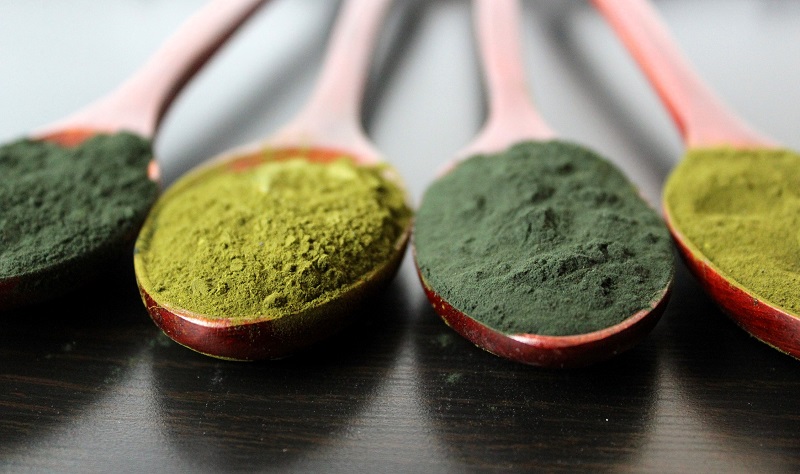
Green superfood powders are dietary supplements made from dried vegetables, herbs, grasses, seaweed, enzymes and other natural substances. A scoop of this powder dissolved in your favorite beverage provides a convenient nutrient-rich superfood drink.
Manufacturers claim one serving of these supplements helps you effortlessly obtain the same nutritional benefits as consuming each food ingredient separately. It’s like squeezing a massive salad into a tablespoon-size serving.
Countless green superfood powders are available, containing anywhere from 25 to 75+ different ingredients. However, common ingredients include:
Some brands also include sweeteners and flavorings in their blend. As such, the taste of these powders can range from grassy and earthy to chocolaty or fruity.
Nutritionally each product varies based on ingredients and processing methods, but typically a serving of a green superfood powder supplement contains:
- 40 to 50 calories per serving
- 5 to 10 grams of carbs
- < 2 grams of fiber
- < 2 grams of sugar
- < 2 grams of protein
- < 1 gram of fat
- Excellent sources of B vitamins and Vitamins C, K, A
Price-wise, green powders typically range from $1 to $4 per serving, which is more expensive than most supplements. So, are they worth the cost or are green powders a waste of money?
Benefits of Drinking Super Greens Powder
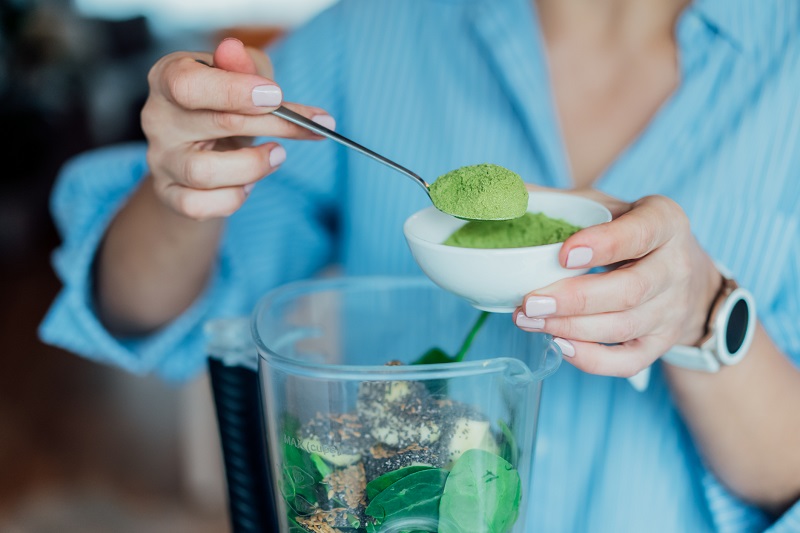
The most significant benefit of green superfood powders is their ability to boost your intake of the crucial nutrients in fruits and vegetables. Research consistently shows that consuming enough nutrient-rich produce improves health and reduces the risk of chronic diseases. Yet, 9 out of 10 people fail to eat the recommended five servings of fruit and vegetables daily.
Convenience, taste and prep time are all factors that stand in the way of people eating more fruits and vegetables – and that’s where green powders can save the day. What could be easier than stirring up 5+ servings of fruits and vegetables into a once-daily 8-ounce drink?
However, while these supplements can help fill some nutritional gaps, they are far from a catch-all nutrition solution for your health goals. Like any supplement, they can’t fully replicate the benefits of fresh produce (more on that later). There is also limited direct evidence proving their effectiveness.
Let’s review some of the common health claims of green superfood powders to help you determine if they’re worth including in your diet.
Immune Support
Green superfood supplements contain high doses of vitamin C, which supports a healthy immune system. But you can easily meet your vitamin C needs with fresh produce at a much more affordable price.
For example, two kiwi fruits provide almost 2x the recommended vitamin C intake. Moreover, a small study found that eating two kiwis daily for four weeks boosted immune cell activity.
Other excellent food sources of vitamin C are bell peppers, oranges, broccoli, strawberries and Brussels sprouts.
Skin Health
Vitamin A and vitamin C are abundant in green powders. These nutrients are vital for protecting and strengthening your skin. However, they play one small part in an overall skin care regimen. If your goal is clear, healthy skin, speak with a dermatologist about a holistic plan.
Weight Management
The link between inflammation and body weight is a vicious cycle. Excess weight leads to increased inflammation, and heightened inflammation makes weight loss more challenging.
Green superfood powders contain loads of antioxidants, which are nutritional compounds that combat inflammation. One small study found that taking a daily fruit and vegetable powder supplement for eight weeks reduced inflammation in adults engaging in a walking program.
While reducing inflammation can aid weight loss, combining antioxidant-rich supplements with a reduced-calorie diet is required for noticeable results.
Bloating and Gut Health
Some green superfood powders contain ingredients that can improve gut health, like probiotics and digestive enzymes. Probiotics are live bacteria strains that fortify the health of your lower digestive tract. There are thousands of different types, and they all do different things.
Digestive enzymes are proteins that help break down your food for digestion. Most people make enough, but sometimes people are deficient (think: lactose intolerance). A deficiency can lead to bloating, gas and discomfort after eating specific foods.
Choosing a supplement with the right types and amounts of probiotics and enzymes to address your specific needs is essential to benefit from these ingredients. Although it may seem that more is better, using a product packed with unnecessary additives can worsen digestive issues, particularly for individuals with conditions like IBS, Crohn’s disease or ulcerative colitis. It’s best to consult with your doctor to explore the available options.
Additionally, it’s important to note that many green superfood powders have low fiber content. Fiber is needed for optimal gut health and to support the growth of probiotics in your digestive tract. Green powders for bloating and digestive health should be used with a fiber-rich diet for maximum benefits.
Blood Pressure and Heart Health
The antioxidants, phytochemicals, vitamins and minerals in green superfood powders may help improve overall heart health. A pilot study including adults with high blood pressure found that taking a green powder supplement for 90 days effectively reduced blood pressure. While this study is promising, more extensive studies are needed to know the effect of green powder supplements on heart health.
Energy and Stress Management
Mental clarity and energy are common benefits attributed to green superfood supplements. There may be a psychological component to this, where starting your day with a healthy drink just mentally makes you feel better.
However, some green powder supplements contain B vitamins and caffeine from green tea extracts. Caffeine can boost energy levels, while B vitamins help convert foods you eat into usable energy.
Additionally, some products claim to regulate hormones and stress levels through herbs like ashwagandha and milk thistle. However, the effectiveness of these remedies is not universally supported by evidence. It’s up to you to decide if you want to invest in these additional ingredients.
The bottom line: Green superfood powders can help ensure adequate nutrient intake, leading to positive health benefits. However, they’re expensive and may contain ingredients that you don’t need. They also work best when included as part of an overall balanced diet and lifestyle.
Green Superfood Powders Versus Fresh Fruits and Veggies

While green superfood powders share some nutritional benefits with fresh produce, there are important differences. First, the processing methods involved in making green powders remove water and fiber content, which are crucial for keeping you full and satisfied after eating. This can make a big difference for people managing their weight.
Second, the health benefits of eating whole fruits and veggies are not due to specific nutrients but the whole food. Whole fruits and veggies have numerous bioactive compounds that we are still discovering. There’s no guarantee that a stripped-down version of these foods will provide the same benefits.
Finally, there’s a significant cost difference. Consider that, on average, a pound of fresh, whole produce costs $0.71, whereas you’ll pay up to $4 for a tablespoon-sized serving of green powder.
Overall, it’s essential to recognize that green powder supplements should not replace eating fresh fruits and veggies. You should prioritize meeting your nutritional needs through whole foods. However, these supplements can help you cover your bases since life is rarely perfect.
Green Superfood Powders Versus a Standard Multivitamin
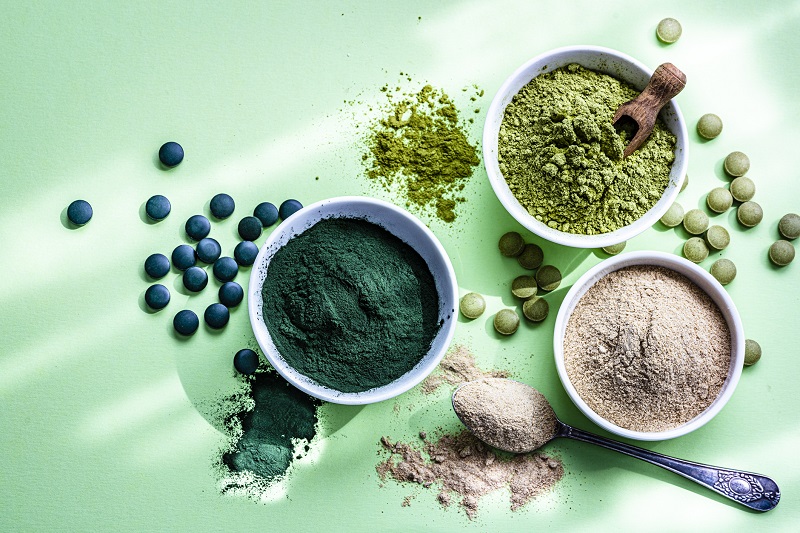
Multivitamins and green superfood powders serve similar roles in providing some extra nutrition to cover nutrition gaps. But is one better than the other?
Ultimately, this comes down to your health goals. Green powders offer natural food ingredients, while multivitamins may contain synthetic forms of vitamins and minerals.
Green powders also provide additional components like probiotics and green tea extracts, while multivitamins focus solely on vitamins and minerals. Consider the value of these extras before making a decision and consult your healthcare provider for guidance.
Side Effects and Risks
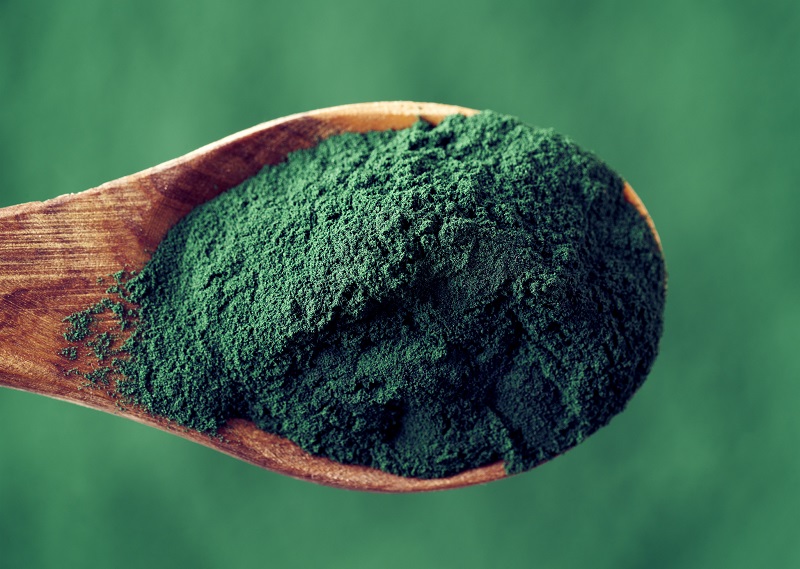
Certain nutrients in green superfood powders can interact with medications or medical conditions, so it is wise to consult your healthcare provider before incorporating supplements into your diet. For example, green powders high in vitamin K may interact with blood clotting medication.
Additionally, some green powder supplements have been found to contain heavy metals. Look for products that are tested for heavy metal contamination, especially if you are pregnant or nursing.
How to Choose the Best Green Powders

As supplements are not as strictly regulated, the quality of green superfood powders can vary. To choose the best options:
- Read the labels – Make sure the ingredients and nutrient levels match your health goals. Avoid options that don’t disclose specific amounts or claim they have a “proprietary” blend.
- Review with your doctor – They’ll know if there are any particular risks or benefits to your health.
- Opt for third-party testing – Choose green powders that third-party organizations like USP or NSF have tested. This ensures that what’s on the label is actually in the product.
How to Incorporate Green Powder Supplements into a Healthy Diet
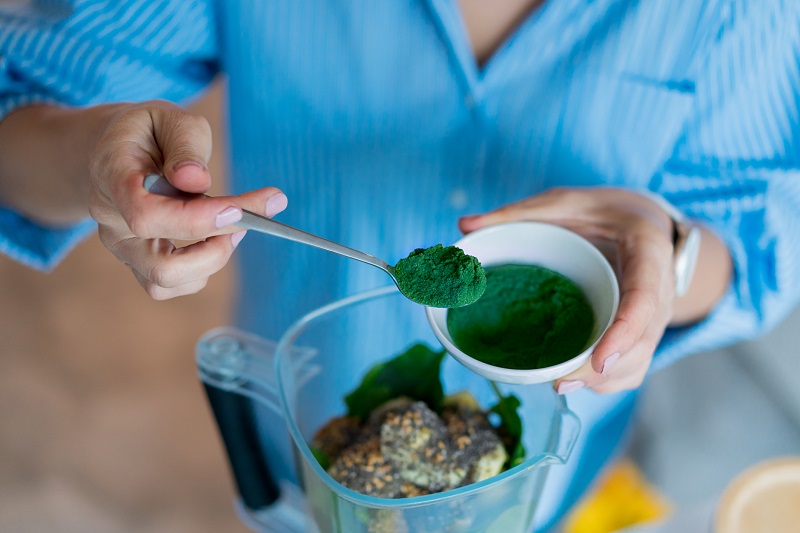
Following the manufacturer’s instructions for incorporating green superfood supplements into your diet is best.
In most cases, mixing a serving into a glass of water is the easiest method. You can also add them to juice, blend them into smoothies or incorporate them into overnight oats. Avoid adding them to hot beverages or foods, as heat may break down some nutritional components.
Conclusion
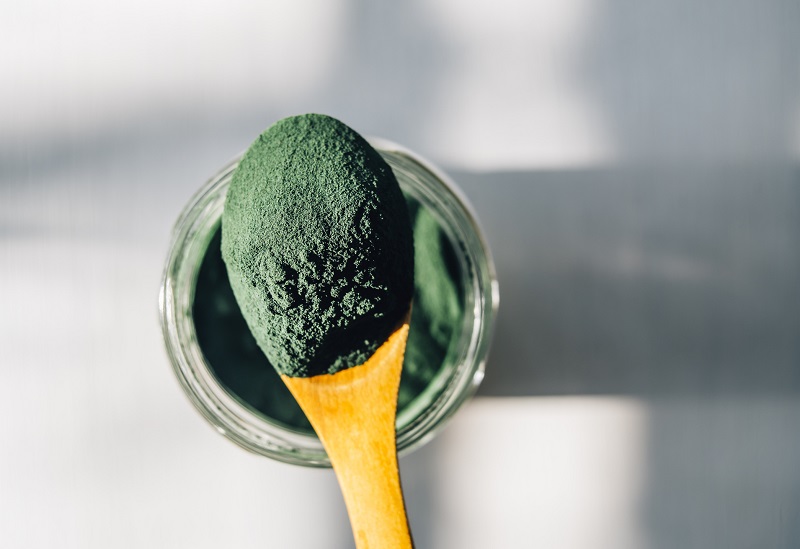
Green superfood powder supplements can be a great way to improve overall nutritional intake. However, they are expensive, and much more research is needed to understand their true benefits.
These supplements should not replace eating fruits and vegetables as they cannot replicate the health benefits of whole foods.
Consulting with your healthcare provider is recommended to ensure compatibility with existing conditions or medications.
If you incorporate green powders in your diet, choose options that align with your health goals, and consider them one part of a broader healthy lifestyle plan.
Need help getting started with a healthy lifestyle plan? Nutrisystem has you covered! Our plans lay out everything you need to start making positive changes to your health in the simplest way possible. Learn more about all they offer and get started with a Nutrisystem plan today.
References
- Aune, D., et al. Fruit and vegetable intake and the risk of cardiovascular disease, total cancer, and all-cause mortality—a systematic review and dose-response meta-analysis of prospective studies. International Journal of Epidemiology. 2017;46(3),1029–1056.
- Lee SH, Moore LV, Park S, Harris DM, Blanck HM. Adults Meeting Fruit and Vegetable Intake Recommendations — United States, 2019. MMWR Morb Mortal Wkly Rep 2022;71:1–9.
- Carr AC, Maggini S. Vitamin C and Immune Function. Nutrients. 2017;9(11):1211. Published 2017 Nov 3. doi:10.3390/nu9111211
- Bozonet SM, Carr AC, Pullar JM, Vissers MC. Enhanced human neutrophil vitamin C status, chemotaxis and oxidant generation following dietary supplementation with vitamin C-rich SunGold kiwifruit. Nutrients. 2015;7(4):2574-2588. Published 2015 Apr 9. doi:10.3390/nu7042574
- VanBuren CA, Everts HB. Vitamin A in Skin and Hair: An Update. Nutrients. 2022;14(14):2952. Published 2022 Jul 19. doi:10.3390/nu1414295
- Pullar JM, Carr AC, Vissers MCM. The Roles of Vitamin C in Skin Health. Nutrients. 2017;9(8):866. Published 2017 Aug 12. doi:10.3390/nu9080866
- Peluso I, Palmery M. The relationship between body weight and inflammation: Lesson from anti-TNF-α antibody therapy. Hum Immunol. 2016;77(1):47-53. doi:10.1016/j.humimm.2015.10.008
- Lamprecht M, Obermayer G, Steinbauer K, et al. Supplementation with a juice powder concentrate and exercise decrease oxidation and inflammation, and improve the microcirculation in obese women: randomised controlled trial data. Br J Nutr. 2013;110(9):1685-1695. doi:10.1017/S0007114513001001
- Zhang J, Oxinos G, Maher JH. The effect of fruit and vegetable powder mix on hypertensive subjects: a pilot study. J Chiropr Med. 2009;8(3):101-106. doi:10.1016/j.jcm.2008.09.004
- Hursel R, Viechtbauer W, Dulloo AG, et al. The effects of catechin rich teas and caffeine on energy expenditure and fat oxidation: a meta-analysis. Obes Rev. 2011;12(7):e573-e581. doi:10.1111/j.1467-789X.2011.00862.x
- Depeint F, Bruce WR, Shangari N, Mehta R, O’Brien PJ. Mitochondrial function and toxicity: role of the B vitamin family on mitochondrial energy metabolism. Chem Biol Interact. 2006;163(1-2):94-112. doi:10.1016/j.cbi.2006.04.014
- United States Department of Agriculture, Economic Research Service. “Agricultural Income and Finance Outlook, 2020.” USDA website. Published June 24, 2020. Accessed July 11, 2023. Available at: https://ift.tt/PNXgevE.
The post Green Superfood Powders: Healthy or Hype? appeared first on The Leaf.
from The Leaf https://ift.tt/VbpO7eF







